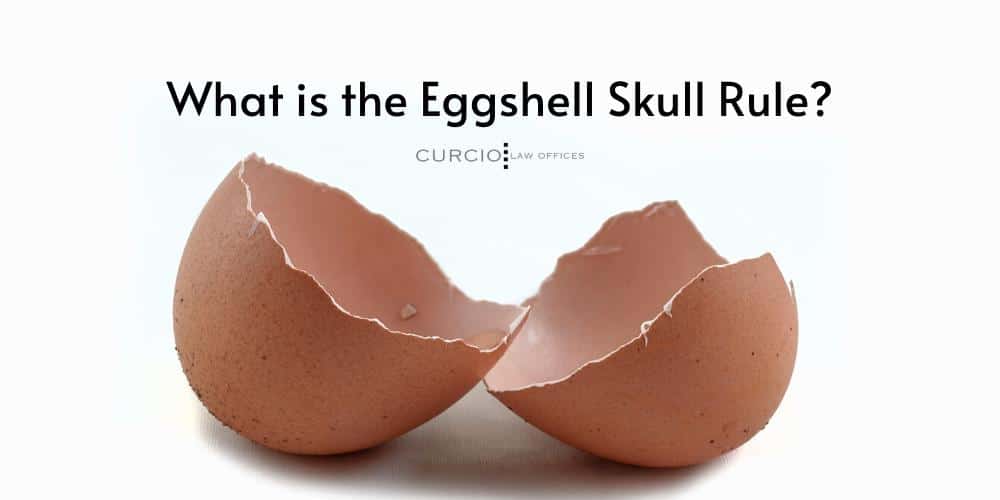A legal doctrine is a single rule, a set of rules, theory, or guiding principle that is widely followed in a field of law. Doctrines can be determined by common sense, precedent, or put forth by judges or other people in positions of power. There are several legal doctrines in place that help guide how a personal injury lawyer may conduct their case. One of these is the egg shell skull rule. This rule is designed to protect accident victims and hold plaintiffs legally responsible for all personal injuries when causing an accident.
If your pre existing injury has worsened due to someone else’s negligence in a car accident, slip and fall accident, or any other type of accident, then you may have grounds to pursue legal action. Call Chicago personal injury lawyers at 312-321-1111 to schedule a free consultation today.
What is the Eggshell Skull Rule?
The eggshell skull rule, also known as the thin skull rule, is a legal doctrine that states that the at fault party is liable for the victim’s injuries, regardless of the presence of a pre existing condition. For example, if someone with osteoporosis got into a car accident because of a negligent driver, and they suffered a more severe injury than someone without this condition might have, then the eggshell skull rule applies. The eggshell skull rule protects victims against plaintiffs who may argue that, in the case above, they shouldn’t be liable for broken bones, because the person they hit was more likely to break a bone anyway.
The general thought behind this rule is that the average plaintiff, or person at fault, who causes an accident can’t know whether or not they’ve hit someone with a pre existing condition, or if the accident would exacerbate and pre existing injuries.
Eggshell Skull Rule vs. the Crumbling Skull Rule
The crumbling skull rule is a legal rebuttal to the eggshell or thin skull rule, which can, in some cases, help plaintiffs avoid liability. The crumbling skull rule refers specifically to individuals who have a progressive medical condition, meaning that their condition will naturally worsen over time. If the defendant’s condition is deemed to be no better or worse than where they might’ve naturally ended up, without the accident, then the injuries caused may not be covered. This can be a much harder stance to take, as it can require copious medical records to prove.
It should be noted that this doctrine only applies when degenerative pre existing medical conditions can be proven. For example, this rule could not be applied to the natural fragility caused by aging, as aging is not caused by a medical condition.
How Do You Know If You Have a Pre-Existing Condition?
What if you don’t discover you have a pre existing condition until you are in an accident — does the eggshell skull rule apply? That depends — if a doctor or medical professional can prove longevity of a condition, then yes, it would. Listed below are some common pre existing conditions that may worsen in the event of an accident:
- Cancer;
- Diabetes;
- Lupus;
- Neck or back injuries such as herniated discs or fractured vertebrae;
- Osteoporosis;
- Nerve damage;
- Scoliosis;
- Traumatic brain injuries;
- Epilepsy.
There are certain mental conditions, such as depression and PTSD, that are also medically classified as pre existing conditions. But emotional distress can be much harder to prove with the eggshell skull rule if you don’t already have a diagnosis, depending on the circumstances.

What Kind of Accidents Does the Eggshell Skull Rule Apply To?
There are several kinds of accidents, or torts, in which the eggshell skull rule may apply. Any accident where the victim suffers both physical and emotional discomfort from their injuries could fall under the eggshell skull doctrine. These could include:
- Car accidents;
- Truck accidents;
- Pedestrian accidents;
- Motorcycle accidents;
- Slip and fall accidents;
- Construction accidents;
- Amusement park accidents;
- Medical malpractice incidents.
The eggshell skull rule applies to all kinds of torts, including intentional tort, negligence, and strict liability cases. These types of cases can be civil (AKA: noncriminal) or criminal cases.
How the Eggshell Skull Rule is Applied to Personal Injury Claims
The eggshell skull rule is specifically suited to protect the defendant in personal injury cases, because it has to do with liability for physical injuries. Chicago personal injury attorneys can use this rule whether or not the defendant has a pre existing medical condition that resulted in a serious injury. While there is no guarantee that the eggshell skull rule will help increase a personal injury case settlement, it can help reassure the injured person of the at fault party’s liability for their accompanying medical bills and lost wages.
Because this is a legal doctrine, and not a law that can vary from state to state, any accident victims can rely on this rule to protect them in a personal injury claim, where the negligent party may have caused damage.
Can The Eggshell Skull Rule Be Applied to Emotional Damages?
Currently, the eggshell skull rule states that an at fault party is liable for physical damage, without specifically covering emotional injuries. Now, strategies around this doctrine will vary from attorney to attorney, depending on the specifics of the case.
Call Chicago Personal Injury Lawyers at Curcio & Casciato Today
If you have suffered severe injuries or worsened pre-existing injuries after an accident, you may have grounds to file a personal injury claim. Every Chicago personal injury lawyer at Curcio & Casciato has extensive knowledge of the eggshell doctrine, especially when it comes to pre-existing injuries. We can examine the details of your personal injury case and determine whether the egg shell skull rule can be used in your favor in order to recover damages such as medical bills and lost wages.
Our personal injury lawyers are the best team to have on your side when it comes to holding a defendant responsible for the physical and emotional injuries they have inflicted upon victims. Call 312-321-1111 to schedule a free consultation with our legal team today.



